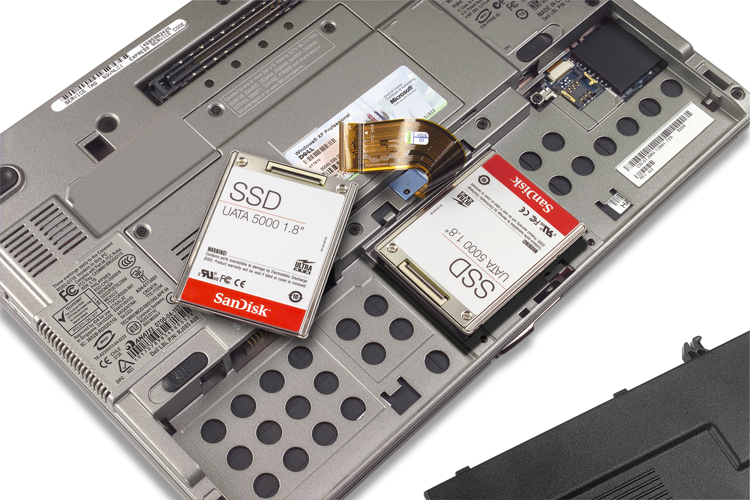SanDisk Develops World’s Smallest 128Gb NAND Chip
SanDisk as developed a 128 Gb NAND Flash memory chip using 19-nm processing technology.
On Wednesday SanDisk said it developed the "world's smallest" 128 gigabit (Gb) NAND flash memory chip which is now in mass production. Built using SanDisk's 19-nm process technology, the chip uses SanDisk’s three-bit per cell (X3) tech that allows the company to build NAND flash memory products with the ability to read and write three bits of information in each memory cell.
So what does this all mean for the general consumer? More storage packed into the same form factors we know and love today like smartphones, tablets and even ultrabooks. The 128 Gb NAND flash memory chip can store 128 billion individual bits of information on a single silicon die 170-mm2 in size.
"At 19-nm, SanDisk is deploying its ninth generation of multi-level cell (MLC) NAND products and fifth generation of X3 technology," the company said in a press release. "This combination of manufacturing and technical expertise helps SanDisk pack more information into each memory cell making it possible to create a smaller, denser NAND flash memory chip."
In addition to the chip's announcement, the company also said it will be presenting a paper at the International Solid-State Circuits Conference (ISSCC) in San Francisco on Wednesday that outlines how its patented advanced all bit line (ABL) architecture was used to achieve an X3 write performance of 18 MB/s. The paper will detail how this achievement can be extended to certain product categories that use MLC NAND flash memory.
Products based on the 128 Gb three-bit per cell technology began shipping late last year, but SanDisk is just now starting to ramp into high volume production. The chip itself was developed jointly by teams from SanDisk and Toshiba at SanDisk’s Milpitas campus, led by Yan Li, director of Memory Design at SanDisk.
The team has also developed a derivative 64 Gb, X3 NAND flash memory chip based on the 128 Gb version which is compatible with the microSD format. SandDisk is ramping up the production of this chip as well.
Get Tom's Hardware's best news and in-depth reviews, straight to your inbox.

Kevin Parrish has over a decade of experience as a writer, editor, and product tester. His work focused on computer hardware, networking equipment, smartphones, tablets, gaming consoles, and other internet-connected devices. His work has appeared in Tom's Hardware, Tom's Guide, Maximum PC, Digital Trends, Android Authority, How-To Geek, Lifewire, and others.
-
kyuuketsuki 128GB SD cards and 64GB micro-SD cards? Yes please. 'Course, I'm sure this stuff will be expensive for the near future...Reply
Actually, I already see a 64GB Sandisk micro-SD card on Newegg... for $130. It's out-of-stock, though. -
A Bad Day I seriously thought it was 128 GB, and after looking at the article closely, it's Gb. 128 Gb is 16 GB.Reply
Unless if it was a misprint. Or if I'm going insane. -
demonicrotato A Bad DayI seriously thought it was 128 GB, and after looking at the article closely, it's Gb. 128 Gb is 16 GB.Unless if it was a misprint. Or if I'm going insane.Reply
As far as I know you are not going insane. The article that is linked specifically says gigabit rather than gigabyte. -
Just a nickname http://www.geek.com/articles/chips/sandisk-19nm-128gb-flash-memory-chip-is-worlds-smallest-20120222/Reply
Look how small it is!
I think the picture induce us in error. I don't think this is going to be used in SSD. More likely going to be used for microsd/sdhc
-
alidan i dont know if this posted, so this may be a triple, sorry if thats the case. this time i'm removing all the math i did. this is the last post, if it doesn't show up this time, ill write it off as i for a sanction and just haven't been told yet.Reply
i just did the math,
so with that math, and its rough math, i have estimated the cost per gb to be .93 cents
now if only i could get this on ssd quality memory, would love to find out how much we are being screwed if we are at all. -
jrharbort aidynphoenixits too slow for ssd.SSDs tend to use multiple flash ICs in multi-channel to boost the speed. And each flash IC can contain 4 or even more of these chips. If you do the math, that can still come out to around 570MB/s theoretical speeds with just 8 ICs.Reply
